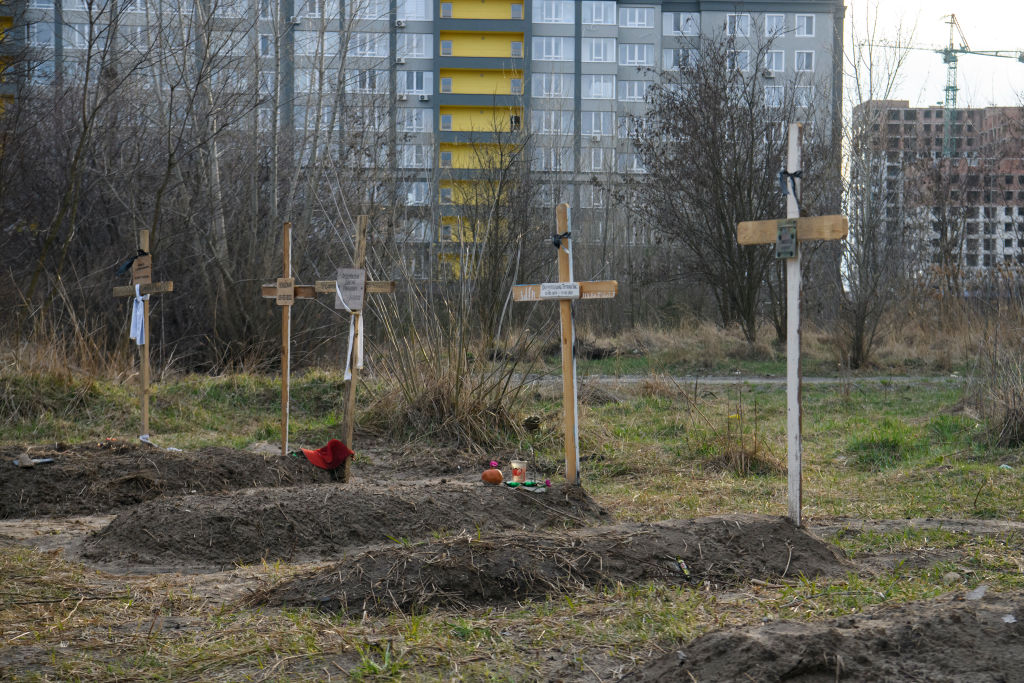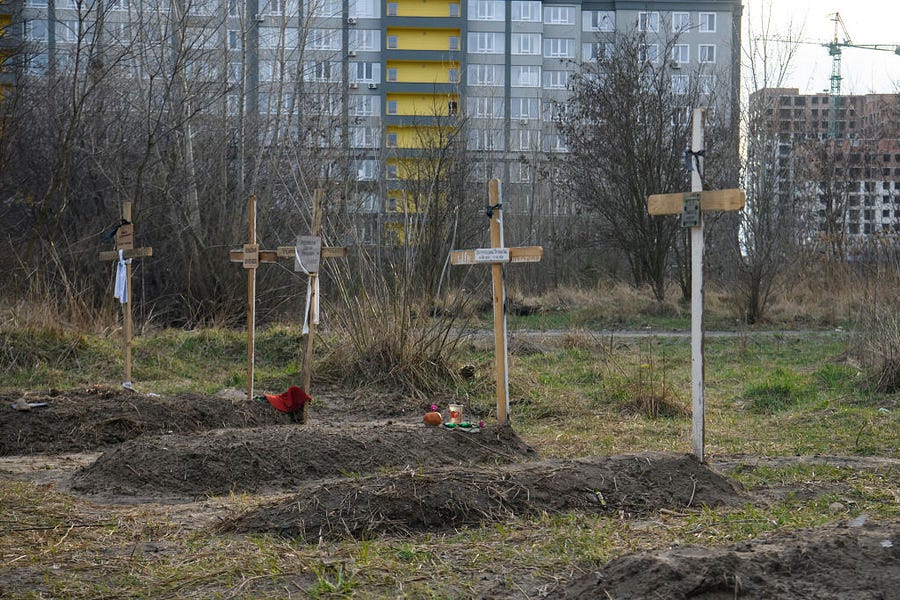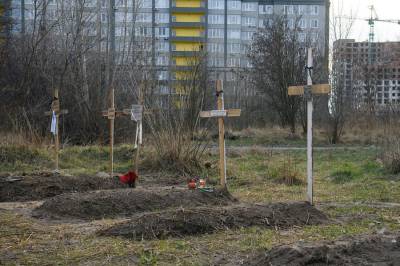Happy Tuesday! A Minneapolis news station found footage of an 11-year-old Prince supporting a teachers’ strike, and researchers say stingrays can add and subtract. These two pieces of information aren’t related, we just thought you’d like to know them.
Quick Hits: Today’s Top Stories
The Senate voted 53-47 on Monday to advance Judge Ketanji Brown Jackson’s nomination to the Supreme Court, a procedural move necessary to break an 11-11 tie in the Judiciary Committee. Republican Sens. Mitt Romney and Lisa Murkowski announced they will join Sen. Susan Collins in supporting Jackson’s final confirmation, which is now on track to take place by the end of this week.
In response to reports of Russian forces massacring civilians in Ukrainian cities, Germany and France announced Monday they will expel dozens of Russian diplomats from their respective countries. “[Russian embassy staffers] have worked here in Germany every day against our freedom, against the cohesion of our society,” German Foreign Minister Annalena Baerbock said. “Your work is a threat to those who seek protection from us. We will not tolerate this any further.”
Lithuania, Latvia, and Estonia have in recent days become the first European Union countries to halt Russian gas imports. Russia accounted for nearly all Lithuanian gas imports in 2015, but about a quarter of them in 2021. “Years ago my country made decisions that today allow us with no pain to break energy ties with the agressor [sic],” Lithuanian President Gitanas Nausėda tweeted. “If we can do it, the rest of Europe can do it too!”
After about 9,000 new COVID-19 cases were reported in Shanghai on Monday, Chinese officials extended the city’s lockdown indefinitely so thousands of health care workers could run mandatory COVID-19 testing on the city’s 26 million residents. In enforcing its strict, zero-COVID stance, the Chinese Communist Party has begun separating children who test positive from their parents, and Shanghai residents are dealing with food and supply shortages due to the extended lockdown.
Days after announcing the end of Title 42, the Biden administration has instructed Immigration and Customs Enforcement lawyers to consider clearing “low-priority” deportation and asylum cases–a move that could cut hundreds of thousands of cases from the current backlog of 1.7 million. The administration defines low-priority cases as those that don’t involve recent crossings or perceived threats to public safety or national security.
One day after President Joe Biden authorized the release of up to 180 million barrels of oil from the Strategic Petroleum Reserve, the International Energy Agency announced its 31 member countries had agreed to release an unspecified amount of oil from their own reserves. More details on timing and volume are expected later this week.
The Kansas Jayhawks defeated the North Carolina Tar Heels 72-69 on Monday to win the NCAA men’s basketball national championship, the fourth in school history and their first since 2008.
It’s Even Worse Than You Thought

In the now 40 days since Russian forces formally launched their invasion into Ukraine, the number of confirmed civilian casualties has been steadily ticking up. More than 400 were dead by March 7, according to the U.N’s. Office of the High Commissioner for Human Rights (OHCHR). Within a week, that number had increased nearly 50 percent. By Monday, OHCHR was reporting that 1,430 Ukrainian civilians had been killed in the fighting—and another 2,097 had been injured.
For weeks, however, every update from the agency has carried a haunting asterisk: “OHCHR believes that the actual figures are considerably higher, as the receipt of information from some locations where intense hostilities have been going on has been delayed and many reports are still pending corroboration.” Over the weekend, the world caught a glimpse at what they meant.
With the Kremlin in the process of executing what Western officials believe to be a face-saving pivot to Ukraine’s eastern Donbas region, Russian troops in recent days have begun retreating—under fire from Ukrainian forces—from the areas surrounding Kyiv where fighting had ground to a stalemate. In one sense, this is welcome news: Ukraine’s resistance was firm enough—for now—to force President Vladimir Putin to downsize his war aims. But at the same time, the newfound absence of Russian troops in northern Ukraine revealed something sinister.
The invaders never captured Kyiv before being driven back, but they did occupy a handful of towns and villages along its perimeter for several weeks. When Ukrainian troops—and journalists—returned to one of those northwestern suburbs, Bucha, over the weekend, they were met with one harrowing scene after another. Rubble where buildings once stood, and demolished military vehicles rusting in the streets. Residents walking past more than 20 dead bodies strewn throughout the city’s roadways, some with their hands tied behind their back. Mass graves, which Bucha Mayor Anatoly Fedoruk claimed held as many as 280 people. (The Dispatch cannot independently verify these figures.)
Speaking with reporters, surviving Bucha residents painted a horrifying picture of the weeks-long occupation, during which Russians allegedly killed civilians more or less indiscriminately.
“[My neighbor] went to get some wood when all of a sudden they started shooting,” Hanna Herega told the Associated Press. “They hit him a bit above the heel, crushing the bone, and he fell down. Then they shot off his left leg completely, with the boot. Then they shot him all over [the chest]. And another shot went slightly below the temple.”
Vitaly Sinadin, a 45-year-old sculptor, told the New York Times Russian troops had tied him to a metal pole in their base for two days, beating him in an effort to extract information about where Ukrainian soldiers were. The Dispatch cannot verify the veracity of these claims, but the international non-profit Human Rights Watch says it has documented instances of rape and summary execution in Bucha and elsewhere.
Russia, unsurprisingly, denied responsibility for the atrocities. “The other day, another fake attack was launched in the city of Bucha,” Foreign Minister Sergei Lavrov said Monday. “After the Russian military personnel left from there in accordance with plans and agreements, a few days later they staged this fake, which is being dispersed through all channels and social networks by Ukrainian representatives and their Western patrons.”
The line, echoed by Russia’s Defense Ministry, will find an audience with the Kremlin’s useful idiots abroad and information-starved Russians at home. A Moscow-based engineer in his 50s told the Washington Post, for example, the footage is “so awful” that “Russians could not have possibly” been behind it. “If this is not fake, my brain refuses to accept it,” he added.
But the idea that Ukrainian officials killed dozens—if not hundreds—of their own citizens to tarnish Russia’s image is patently absurd. Even if you thought Ukrainian President Volodymyr Zelensky were capable of stooping to such depths, satellite imagery released yesterday forecloses the possibility of Lavrov’s story being true. At least 11 of the dead bodies lying in the street had been there since March 11, according to surveillance footage from Maxar Technologies—a date that Russian forces were still in control of the city. Bellingcat, the investigative outlet focusing on cyber and national security, agreed with that analysis.
Zelensky visited the wreckage on Monday, vowing to rebuild and speaking with reporters about what he saw. “It is very important for us that journalists are here. We want you to show the world what was happening here, what the Russian military was doing, what the Russian Federation was doing in peaceful Ukraine,” he said. “These are war crimes and they will be recognized by the world as genocide. We are aware of thousands of people killed and tortured, with their limbs cut off. Raped women, murdered children. I believe this is genocide.”
After weeks of indiscriminate bombings appearing to be aimed at civilian targets—a maternity hospital in Mariupol, civilians huddling inside an art school—the world more or less coalesced around the idea that Russian forces were committing war crimes. But genocide—defined by the U.N. as any act “committed with intent to destroy, in whole or in part, a national, ethnical, racial or religious group”—is a different story.
Still, even some skeptics of the applying the label changed their minds in the wake of the Bucha story. “Scholars of the Holocaust are very cautious about using the term ‘genocide,’” Eugene Finkel—history and political science professor at Johns Hopkins’ School of Advanced International Studies—told The Dispatch. “We don’t go there unless we’re 100 percent sure. I myself, a couple years ago, wrote about how states in Eastern Europe—Ukraine included—use the word ‘genocide’ for political reasons and cheapen it.”
He doesn’t think it’s “cheapening” the word for Zelensky to use it now—and this weekend was his personal tipping point, for two reasons. “One is the realization that Bucha was not an isolated incident; we can’t write it off as some soldier, junior officer that just lost it and started killing civilians. It’s actually much more widespread, which suggests either coordinated policy or higher-ups turning a blind eye,” he argued. “[Second] is this completely insane publication … published in state-run media, which means it had to receive an approval from above.”
The article in question was published in RIA Novosti over the weekend, and seeks to blur the line between soldier and civilian when it comes to the “denazification” of Ukraine. “The Nazis who have taken up arms should be destroyed as much as possible on the battlefield,” Timofey Sergeytsev wrote, arguing Ukrainian Nazism more of a “threat to peace” than Adolf Hitler’sversion. “However, in addition to the top, a significant part of the masses, who are passive Nazis, accomplices of Nazism, are also guilty. They supported and indulgated Nazi power. … Denazification will inevitably be de-Ukrainianization.”
The brutal tactics exhibited in Bucha are certainly in line with a Russian military that has inflicted unbearably high civilian casualty numbers in Syria and Chechnya. But John Spencer—a retired U.S. Army major and chair of Urban Warfare Studies at the Modern War Institute—argued what took place near Kyiv was even worse. “You target a hospital with bombings, the difficulty with urban warfare is you can always say that that was being used as a military target, there were military people in it,” he told The Dispatch. “But when you tie somebody’s hands behind their back and shoot them in the back of the head like we know happened in Bucha … as an old soldier, that’s a very special kind of evil that could do that. I don’t know if it was planned, if it was ordered, but it was definitely organized.”
Given the limited information, Russian military experts were split on that question, whether the massacre in Bucha was the result of a direct order from the Kremlin or a natural outgrowth of heated rhetoric and Russian underperformance on the battlefield. “If I had to guess, it’s likely a combination of the demonization of these people—the ‘nazification’ that Russian leadership is putting in their mind—and the frustrations of the soldiers who know this war better than anybody in Russia. I mean, the number of people they've lost is tremendous on a military scale,” one such expert told The Dispatch. “All of those create the conditions for something as horrid as this. The blame goes all the way down and all the way up.”
President Biden had no problem apportioning that blame. “You may remember I got criticized for calling Putin a war criminal,” he reminded reporters on Monday, unprompted. “Well, the truth of the matter—you saw what happened in Bucha. He is a war criminal. But we have to gather the information, we have to continue to provide Ukraine with the weapons they need to continue the fight, and we have to get all the detail so this can be an actual … wartime trial.” Asked by a reporter if he now views the war as a genocide, Biden—likely wary of making the case for more direct U.S. involvement—said no.
The odds of Putin being tried before an international human rights tribunal are exceedingly slim, but the comment—which comes days after Biden argued Putin “cannot remain in power”—represents another rhetorical escalation by the president. But more important to the fate of Ukraine, the horrors coming out of Bucha will almost assuredly spur another round of policy escalations by the United States and its allies.
Linda Thomas-Greenfield—the U.S. ambassador to the United Nations—called on countries around the world to vote in favor of suspending Russia from the U.N. Human Rights Council, and National Security Adviser Jake Sullivan said the Biden administration is working “intensively” with European allies to further tighten sanctions on Moscow. The European Union echoed that sentiment on Monday, with its chief diplomat Josep Borrell saying any perpetrators of war crimes “will be held accountable.”
German and French officials announced the expulsion of dozens of Russian diplomats in response to the revelations, and three Baltic states—Lithuania, Latvia, and Estonia—have officially untethered themselves from Russian gas. Expect another debate in the coming days about whether Western countries should get involved in the conflict militarily and/or increase their military aid to Ukrainian fighters. But if the goal is to prevent similar atrocities from happening in other cities across the country, it’s likely too late, as Bucha was far from the only town Russian forces occupied for the past month.
As Raphael Cohen—Iraq War veteran and director of the RAND Corporation’s Strategy and Doctrine Program—told The Dispatch, “I think the safe assumption would be that this is not going to be an isolated incident.”
Worth Your Time
For more on Russian forces’ cruelty in northern Ukraine, read Christoph Reuters’ dispatch for Der Spiegel from the recently liberated city of Trostyanets. “Russian controls of the population grew increasingly brutal as time passed,” he notes. “Those found to be carrying smartphones would lose them—in the best-case scenario. Young men were taken to the interrogation center the Russians set up at the train station and beaten. One young man—who insists that he learned the coordinates of a Russian position in the city completely by accident through a Telegram group—presumably only escaped death because his mother came and begged for his life on her knees. And because a soldier from the Caucasus felt sorry for her. Those who were still on the street after 3 p.m. were at risk of being shot dead. A fate that befell a cyclist and a man who was running to the hospital because his wife had gone into premature labor. A 60-year-old veteran of the Soviet war in Afghanistan named Alexander Vilinsky was also shot dead because he refused to be driven out of his home by Russian troops.”
For Bloomberg, Virginia Postrel interviews Mónica Guzmán about her new book I Never Thought of It That Way on the importance of having “fearless” conversations in our polarized era. “The kind of political polarization that matters here is called ‘affective polarization, which is when people distrust each other because of how they feel about each other, not because of actual disagreements,” Guzmán says. “If you don’t have conversations where you are speaking with—and not just about—somebody who thinks differently from you, you’re going to be more vulnerable to misperceptions and to an elevated sense of fear that people on the other side are very dangerous. We have studies showing that each side thinks the other despises them twice as much as they actually do. There’s also research that shows that when you ask someone on one side to guess at the ideas of the other, they’ll think that they’re more extreme than they actually are. If you don’t have someone in your life that you are talking with, you may not actually see the reality of people who disagree with you.”
Presented Without Comment
Also Presented Without Comment
Also Also Presented Without Comment
Toeing the Company Line
On today’s episode of Advisory Opinions, David and Sarah walk through a ruling on race-motivated changes to a Virginia school’s admissions policy, discuss a defamation verdict against Oberlin College, dive into the Disney wars in Florida, and finish with their thoughts on Duke v. UNC.
On the site today, Andrew Fink writes about the atrocities in Bucha as a one-time resident of the town, and Frederick Hess and Hayley Sanon break down the Biden administration’s new proposed regulations on charter schools.
Let Us Know
Do the developments out of Bucha change your mind about how involved in the conflict you’d like to see the United States get? Does it matter whether the atrocities were the result of a direct order from high-ranking Kremlin officials or a rogue military unit?
Update, April 5, 2022: This newsletter was updated with additional reporting.







Please note that we at The Dispatch hold ourselves, our work, and our commenters to a higher standard than other places on the internet. We welcome comments that foster genuine debate or discussion—including comments critical of us or our work—but responses that include ad hominem attacks on fellow Dispatch members or are intended to stoke fear and anger may be moderated.
With your membership, you only have the ability to comment on The Morning Dispatch articles. Consider upgrading to join the conversation everywhere.